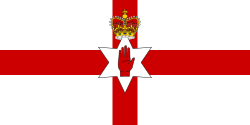North Londonderry (Northern Ireland Parliament constituency)
Coordinates: 55°05′42″N 6°45′47″W / 55.095°N 6.763°W
| North Londonderry | |
|---|---|
|
Former County Constituency for the Parliament of Northern Ireland | |
|
North Londonderry shown within Northern Ireland | |
| Former constituency | |
| Created | 1929 |
| Abolished | 1972 |
| Election method | First past the post |
North Londonderry was a county constituency comprising the southern part of County Londonderry. It was created in 1929, when the House of Commons (Method of Voting and Redistribution of Seats) Act (Northern Ireland) 1929 introduced first-past-the-post elections throughout Northern Ireland. It was created in 1929 as one of five single-member constituencies replacing the former five-member Londonderry constituency. The constituency survived unchanged, returning one member of Parliament until the Parliament of Northern Ireland was temporarily suspended in 1972, and then formally abolished in 1973.[1]
The constituency included the towns of Coleraine, Limavady and Portstewart.[2]
The seat was always held by Ulster Unionist Party candidates, and was rarely contested.[3]
Members of Parliament
- 1929–1933: John Martin Mark, Ulster Unionist Party
- 1933–1938: Daniel Hall Christie, Ulster Unionist Party
- 1938–1958: Robert Moore, Ulster Unionist Party
- 1958–1973: Joseph Burns, Ulster Unionist Party
- Source:[3]
Election results
 |
| This article is part of a series on the politics and government of Northern Ireland 1921–72 |
At the Northern Ireland general election, 1929, John Martin Mark was elected unopposed.
At the Northern Ireland general election, 1933, Daniel Hall Christie was elected unopposed.
At the Northern Ireland general election, 1938, Robert Moore was elected unopposed.
| Party | Candidate | Votes | % | ± | |
|---|---|---|---|---|---|
| UUP | Robert Moore | 11,003 | 77.4 | N/A | |
| NI Labour | J. D. Murphy | 3,219 | 22.6 | N/A | |
| Majority | 7,784 | 54.8 | N/A | ||
| Turnout | 14,222 | 68.3 | N/A | ||
| UUP hold | Swing | ||||
At the Northern Ireland general election, 1949, Robert Moore was elected unopposed.
| Party | Candidate | Votes | % | ± | |
|---|---|---|---|---|---|
| UUP | Robert Moore | 11,242 | 77.4 | N/A | |
| Independent Unionist | S. J. Henderson | 2,343 | 17.2 | N/A | |
| Majority | 8,899 | 75.6 | N/A | ||
| Turnout | 13,585 | 62.4 | N/A | ||
| UUP hold | Swing | ||||
At the North Londonderry by-election, 1960, and the 1962 and 1965 Northern Ireland general elections, Joseph Burns was elected unopposed.
| Party | Candidate | Votes | % | ± | |
|---|---|---|---|---|---|
| UUP | Joseph Burns | 9,364 | 50.3 | N/A | |
| Independent Unionist | J. W. S. Barr | 9,249 | 49.7 | N/A | |
| Majority | 115 | 0.6 | N/A | ||
| Turnout | 18,613 | 76.1 | N/A | ||
| UUP hold | Swing | ||||
- Source:[3]
References
- ↑ The Northern Ireland House of Commons, 1921-1972, Northern Ireland Elections
- ↑ Northern Ireland Parliamentary Election results: Constituency Boundaries
- 1 2 3 Northern Ireland Parliamentary Election Results: Counties: Londonderry
.svg.png)